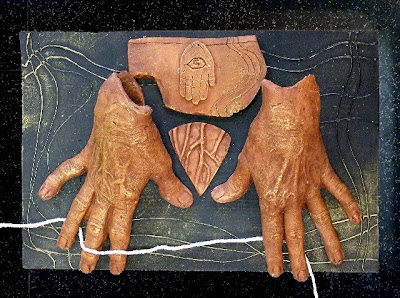When I lived in Vermont in the early 80's, I became interested in energy work, and went to see a famous energy worker named Eleanor Moore, who lived in Peterborough, N.H. I remember when I first called her to set up an appointment, there was a powerful scent of peppermint throughout my studio after I set down the phone........later she told me nonchalantly it was one of her guides, leaving herbs.
Once I went to visit Eleanor, and a young woman was sitting in her conference room, her bald head wrapped in a scarf. I sat there with her a long time, and finally Eleanor came in, and my appointment began. I asked her who the woman was, and why she wanted me to hang with her, and she told me she had cancer, she needed me to give her some extra energy, and didn't I see the blue light coming out of my forehead for her? I had to answer that I did not, and forgot about it. A year later I went to visit Eleanor again, and asked about the young woman. Her response amazed me: "Oh, that girl!" she said, "she just had to get even with her father, so she went and died!"
Eleanor's uncharacteristic lack of compassion surprised me, and at the time, I didn't have any understanding of either psychology, or energy medicine. Years later, I discovered Carolyn Myss and her book
Anatomy of the Spirit , which helped me to heal from illness, and to release a life that ended with a divorce, in order to go forward into a new life. Her way of dealing with our "energy bank account", and our unconscious "shadow energies" helped me to, as she puts it, to "pull my spirit back" from the past, in order to go forward.
Carolyn is a tough, passionate spiritual leader who isn't afraid to "tell it like it is", and I've been grateful to her ever since. I'm still on the road, without much time to write, but wanted to share here a few of her brief talks for anyone who isn't familiar with Carolyn. Among many other ideas, she coined the term "woundology", which is widely used now in spiritual and psychological circles - a difficult insight that I had to look at for myself.
As she recounts, in 1988 Myss had an experience that made her realize the power that lies in "being wounded".
"One day, in passing, I introduced a friend of mine to two gentlemen I was talking with," says Myss. "Within two minutes, my friend managed to let these men know that she was an incest survivor. Her admission had nothing whatsoever to do with the conversation we'd been having, and in a flash I realized that she was using her wounds as leverage. She had gotten to the point that she defined herself by a negative experience."
Once Myss became attuned to this phenomenon, which she called
"woundology", she saw it everywhere.
"In workshops and in daily life I saw that, rather than working to get beyond their wounds, people were using them as social currency, they were confusing the therapeutic value of self-expression with permission to manipulate others with their wounds. Who would want to leave that behind? Health never commands so much clout!"
At this point, Myss began to realize that people did not always want to heal.
Why People Don't Heal and How They Can shows how choosing to stay stuck in woundology often comes at a terrible price: the loss of health.
"We are given a finite amount of energy to run our physical bodies, our minds, and our emotions, as well as to manage our external environments, and when we choose to siphon off this energy to keep negative events in our histories alive, we are robbing that energy from our cell tissue, making ourselves vulnerable to the development of disease."
Once this path is seen as the true energy debt that it is, choosing health means choosing to release the weight of the past. Too often, this is something that people just can't or won't do, because it can also be a life ploy that negotiates for them. Myss also teaches that
"While the practice of woundology is a common source of illness, personal negativity is not always the cause; as contradictory as it seems, sometimes illness can be the answer to prayer. Our spiritual development is meant to culminate in an ability to see things impersonally, to recognize the greater meaning of life's challenges apart from the literal events. To that end, illness can physically guide us onto a path of insight and learning upon which we would otherwise never have set foot. It is an unparallelled catalyst for expanding personal consciousness."











![[earthshrines5+Small+Web+view.jpg]](https://blogger.googleusercontent.com/img/b/R29vZ2xl/AVvXsEgMU4I4dnrDPQ5tOcjzzBUmWDQPKDtoJlX5OlM7VMUpbqyX5T6NUjoKjuK9zi474hluUWtM5enSQyJV8VXz2lbEDLzW0xKliHDDWVH-DotiUFL2xH4pDa8l1M3S81rGLA1rm0yDMsme0D0s/w224-h400/earthshrines5+Small+Web+view.jpg)
![[nov%2017%20008%20Medium%20Web%20view.jpg]](https://blogger.googleusercontent.com/img/b/R29vZ2xl/AVvXsEgyfnHYzdQiykbTHVBepcCh5rsm8UksPRl84dG8ceKbeIFIf20jQ9TjEgypZqiPJZmCm9_VsoCw8aIsiKa2IE7oXqsGYZwcfA6tfTwOIEzGVXPlRYAYcE9IPusxUxbAutkEu709L5Peb6QE/s1600/nov%252017%2520008%2520Medium%2520Web%2520view.jpg)


